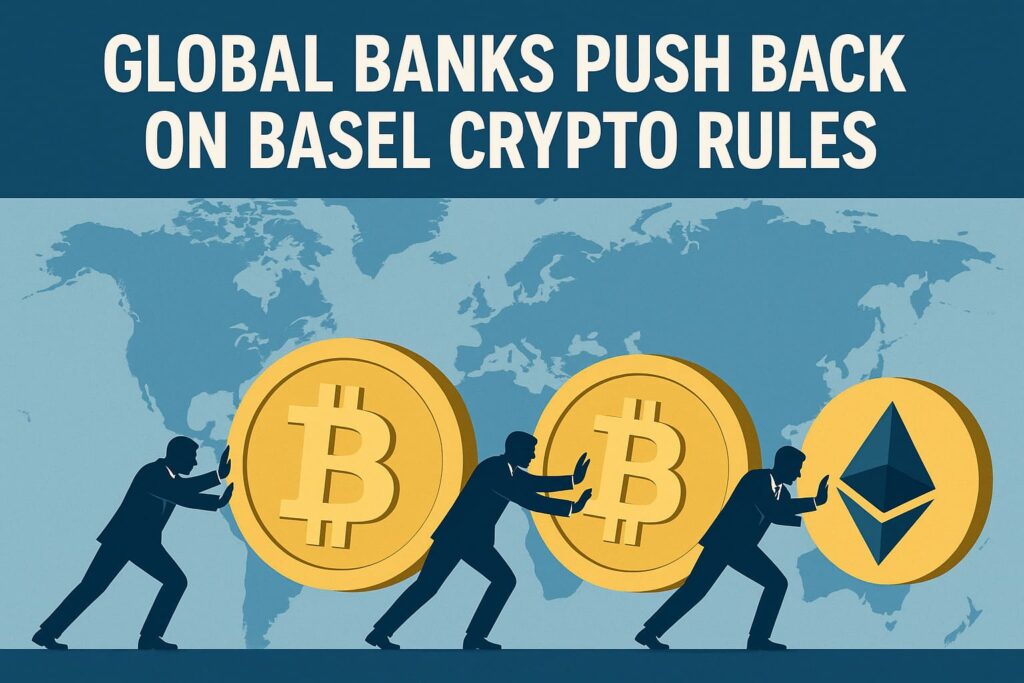The global finance industry is locked in a debate with regulators. The Basel Committee’s crypto rules, planned for 2026, are facing resistance. Banks argue the framework no longer reflects today’s digital asset landscape. Instead, it risks limiting innovation and weakening stability.
Why Basel Introduced Crypto Rules
The Basel Committee first drafted its crypto standards in 2022. That was a year of collapse, scandal, and uncertainty. FTX imploded. Stablecoins lost their peg. Investors lost billions. Regulators feared contagion spreading into mainstream banking.
The response was strict rules. Crypto assets received the highest risk weightings. Banks were told to hold huge capital buffers. The idea was to protect taxpayers and prevent systemic shocks.
Why Banks Want Change
Finance industry bodies say the world has shifted since 2022. Crypto is no longer fringe. It is slowly becoming part of the mainstream. Tokenized bonds, stablecoins, and blockchain payments are expanding.
Groups like the Global Financial Markets Association, the Institute of International Finance, and ISDA are leading the pushback. They argue the rules make banking with crypto impossible. Capital requirements would wipe out profitability. That means banks would avoid digital assets altogether.
The Risk of Driving Innovation Away
Banks warn that extreme rules will not stop crypto. Instead, they will drive it into unregulated spaces. If licensed banks retreat, offshore exchanges and shadow markets will dominate. That is where fraud, instability, and contagion thrive.
Industry leaders say regulated banks must be allowed to provide custody, settlement, and risk management. Otherwise, crypto growth will happen outside the safety net of oversight.
The Case for Proportional Regulation
Banks are not asking for zero rules. They want proportional treatment. Stablecoins backed by dollars should not be treated like volatile altcoins. Tokenized government bonds should follow rules for traditional securities.
They say regulation must recognize the spectrum of risk. Painting all digital assets with the same brush is misguided. Flexibility encourages safe adoption while still protecting against collapse.
Political Winds Shape the Debate
Politics now adds new pressure. The Trump administration in the United States has supported friendlier crypto policies. American regulators face pressure not to strangle innovation. European regulators are also weighing competitiveness.
If Basel rules are too strict, Western banks could fall behind global rivals. Policymakers risk choking opportunities at the very moment economies seek modernization.
Why Timing Matters
Basel rules are set for rollout in January 2026. Banks say this is too soon. They want more time for research and calibration. A pause could allow pilot projects, risk studies, and proper adjustment. A rushed launch could damage adoption permanently.
For institutions preparing for digital settlement systems, the timeline feels dangerous. They argue delaying implementation protects both markets and regulators.
Supporters of Strict Rules Push Back
Not everyone agrees with the banks. Regulators highlight crypto’s history of instability. Supporters argue strict rules protect taxpayers from bailouts. They remind us of the billions lost during market collapses.
Their concern is that loosening standards invites another disaster. For them, safety must come first, even if innovation slows.
Lessons from Financial History
Financial innovation often moves faster than regulation. In the 1980s, derivatives grew quickly while oversight lagged. Crises followed. Critics warn crypto could repeat that cycle.
Banks counter that crypto already exists and cannot be ignored. Regulation should guide adoption rather than block it. Learning from past financial products is key to building smarter rules.
What Is at Stake for Global Finance
The outcome will shape how crypto interacts with mainstream finance. If Basel adapts, banks can lead safe innovation. If not, crypto may thrive outside the regulated world.
Either path carries risks. Either path will decide how institutions, investors, and governments engage with digital assets in the next decade.
Conclusion: A Turning Point for Regulation
The clash between banks and Basel highlights a historic turning point. Finance is no longer debating whether crypto belongs. The debate is about how to include it.
If regulators listen, the result could be balanced rules that manage risk and promote progress. If they refuse, banks may step back while shadow markets expand.
The next two years will be decisive. Crypto is here to stay. The question now is whether global regulators can adapt before it moves beyond their reach.
Also read:




